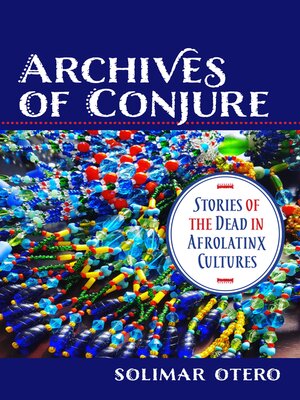Archives of Conjure
ebook ∣ Stories of the Dead in Afrolatinx Cultures · Gender, Theory, and Religion
By Solimar Otero

Sign up to save your library
With an OverDrive account, you can save your favorite libraries for at-a-glance information about availability. Find out more about OverDrive accounts.
Find this title in Libby, the library reading app by OverDrive.



Search for a digital library with this title
Title found at these libraries:
| Library Name | Distance |
|---|---|
| Loading... |
In Afrolatinx religious practices such as Cuban Espiritismo, Puerto Rican Santería, and Brazilian Candomblé, the dead tell stories. Communicating with and through mediums' bodies, they give advice, make requests, and propose future rituals, creating a living archive that is coproduced by the dead. In this book, Solimar Otero explores how Afrolatinx spirits guide collaborative spiritual-scholarly activist work through rituals and the creation of material culture. By examining spirit mediumship through a Caribbean cross-cultural poetics, she shows how divinities and ancestors serve as active agents in shaping the experiences of gender, sexuality, and race.
Otero argues that what she calls archives of conjure are produced through residual transcriptions or reverberations of the stories of the dead whose archives are stitched, beaded, smoked, and washed into official and unofficial repositories. She investigates how sites like the ocean, rivers, and institutional archives create connected contexts for unlocking the spatial activation of residual transcriptions. Drawing on over ten years of archival research and fieldwork in Cuba, Otero centers the storytelling practices of Afrolatinx women and LGBTQ spiritual practitioners alongside Caribbean literature and performance. Archives of Conjure offers vital new perspectives on ephemerality, temporality, and material culture, unraveling undertheorized questions about how spirits shape communities of practice, ethnography, literature, and history and revealing the deeply connected nature of art, scholarship, and worship.







